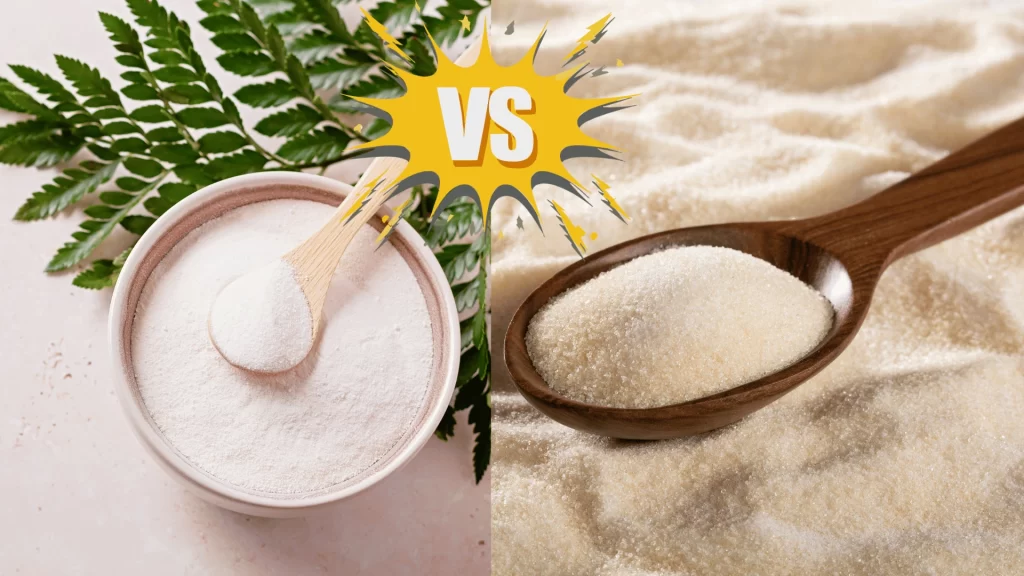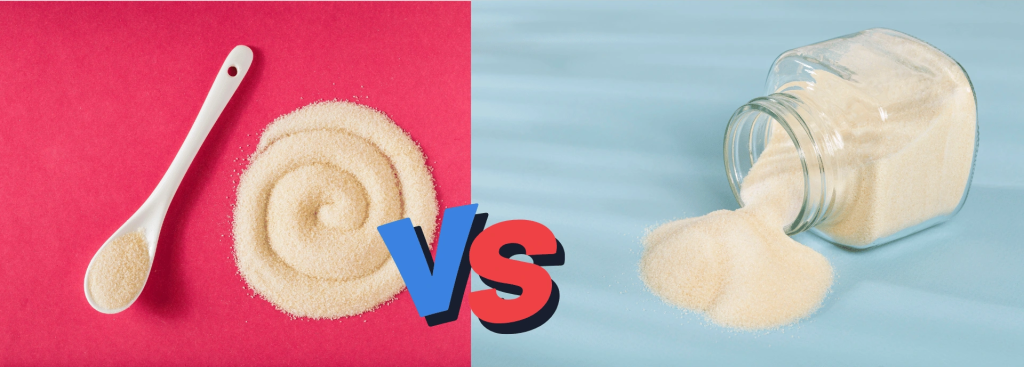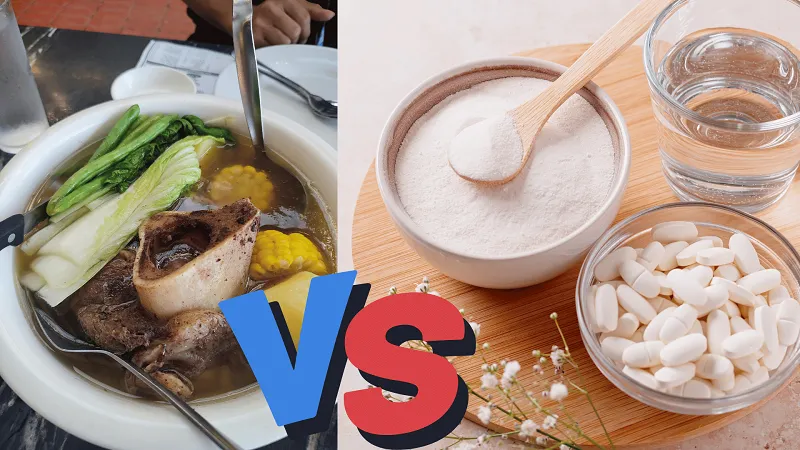Imagine standing in the supplement aisle, staring at rows of bottles promising smoother skin, stronger joints, and a youthful glow. Two names keep popping up: marine collagen and collagen peptides. They sound similar, but are they? Maybe you’re wondering if one’s the secret to that radiant complexion you’ve been chasing, or if the other could ease those creaky knees after a long run. Let’s unravel the mystery of marine collagen vs collagen peptides, diving into what they are, their benefits, and how to choose the right one for you. Spoiler: it’s not a one-size-fits-all answer, but we’ll get you closer to figuring it out.
What is Collagen?
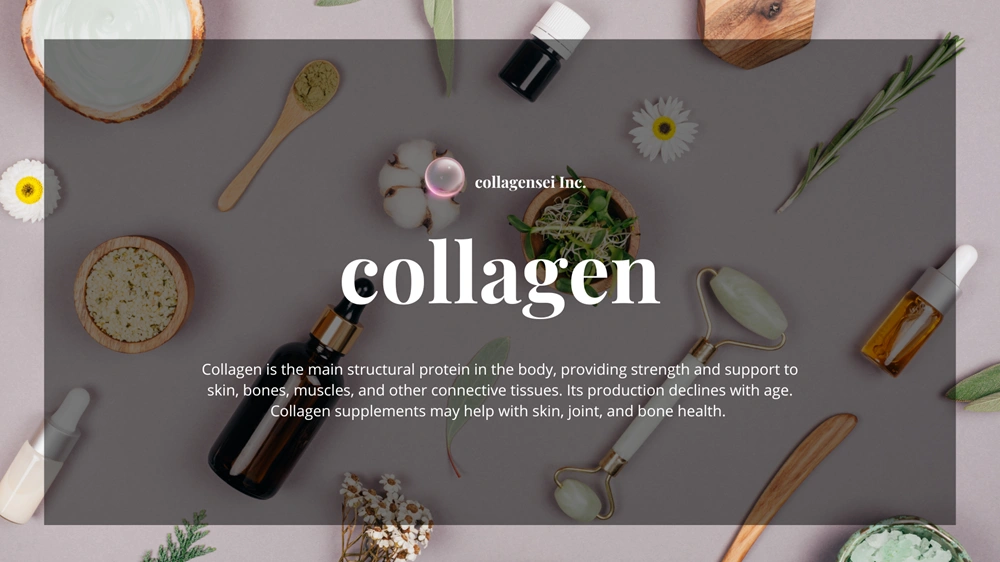
Collagen is the unsung hero of your body, the scaffolding that keeps your skin plump, your bones sturdy, and your joints moving smoothly. It’s the most abundant protein in your body, making up about 30% of your total protein content, and it’s found in your skin, bones, muscles, tendons, ligaments, and even blood vessels. Think of it as the glue that holds you together, giving your body structure and strength. But here’s the catch: starting in your mid-20s, your body’s collagen production starts to slow down, dropping by about 1% each year. By the time you’re 40, you’re producing significantly less, which can lead to wrinkles, sagging skin, joint discomfort, and weaker muscles.
There are at least 28 types of collagen, but the stars of the supplement world are Types I, II, III, V, and X. Here’s a quick rundown:
- Type I Collagen: The MVP, found in skin, bones, tendons, ligaments, and teeth. It’s what keeps your skin elastic and your bones strong.
- Type II Collagen: The joint specialist, making up the cartilage that cushions your knees, elbows, and hips.
- Type III Collagen: A sidekick to Type I, found in skin, blood vessels, and internal organs, helping maintain their structure.
- Type V Collagen: Plays a role in cell surfaces, hair, and the placenta, supporting tissue formation.
- Type X Collagen: Found in cartilage, particularly where bones form, aiding in bone development and repair.
As collagen levels dip with age, factors like sun exposure, smoking, or a poor diet can speed up the decline. That’s where dietary supplement ingredients like collagen come in, often crafted into custom formulas through advanced powder manufacturing to help replenish what time takes away.
Marine Collagen vs Collagen Peptides: What’s the Difference?
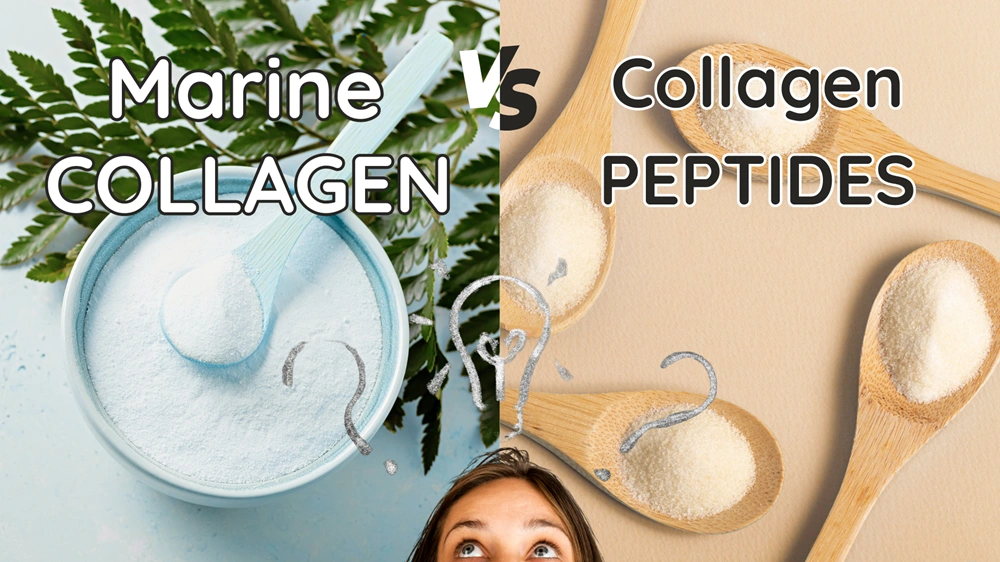
Let’s clear up the confusion. Collagen peptides are collagen proteins that have been broken down (or hydrolyzed) into smaller, more digestible pieces, making them easier for your body to absorb. They can come from various sources—cows, pigs, chickens, or fish. Marine collagen, on the other hand, is a specific type of collagen peptide sourced exclusively from fish, usually their skin and scales. So, all marine collagen is collagen peptides, but not all collagen peptides are marine collagen.
In the supplement world, “collagen peptides” often refers to bovine-sourced collagen (from cow hides or bones), while “marine collagen” highlights its fishy origins. The key difference lies in their source and collagen type. Marine collagen is primarily Type I, ideal for skin health, while bovine collagen peptides typically offer a mix of Types I and III, supporting a broader range of tissues like skin, joints, and even your gut. Some studies suggest marine collagen might be more bioavailable—meaning your body can use it more efficiently—due to smaller peptide sizes, but the evidence isn’t conclusive yet .
Benefits of Marine Collagen
Marine collagen has a certain allure, like a gift from the ocean. Sourced from fish skin and scales, often as a byproduct of the fishing industry, it’s not only effective but also a nod to sustainability. Here’s why it’s making waves in sports nutrition and beyond:
- Skin Health Glow-Up: Marine collagen is packed with Type I collagen, the star player for skin elasticity and hydration. A 2015 study in the Journal of Cosmetic Dermatology found that women aged 35-55 who took marine collagen peptides for eight weeks saw significant improvements in skin moisture, elasticity, and wrinkle reduction compared to a placebo group . It’s like giving your skin a sip of youth.
- High Bioavailability: Some research suggests marine collagen’s smaller peptide molecules are absorbed more easily than bovine collagen, potentially delivering faster results . Think of it as a speedboat versus a cargo ship—both get you there, but one might be a bit quicker.
- Sustainability Win: By using fish byproducts, marine collagen reduces waste, making it an eco-friendly choice in powder manufacturing processes.
- Allergy and Dietary Friendly: If you avoid beef for religious, ethical, or allergy reasons, marine collagen is a great alternative, provided you’re not allergic to fish.
Beyond skin, marine collagen may support joint health by promoting cartilage repair, though studies are more limited here compared to bovine collagen. It’s also being explored for wound healing and bone regeneration, with promising results in animal studies .
But it’s not perfect. Marine collagen can be pricier, and if you’re allergic to fish, it’s a hard pass. Some folks also report a slight fishy aftertaste in lower-quality products, so choosing high-quality supplements with robust packaging services is key.
Benefits of Collagen Peptides (Bovine)
Bovine collagen peptides, typically sourced from cow hides, are the workhorse of the collagen world—reliable, widely available, and packed with benefits. They’re a staple in joint health supplements and sports nutrition manufacturing, and here’s why:
- Versatile Collagen Types: Bovine collagen delivers both Type I and Type III collagen. Type I supports skin, hair, and nails, while Type III is found in blood vessels and the gut lining, potentially aiding digestive health. This combo makes bovine collagen a multitasker.
- Joint Health Support: Research backs bovine collagen for easing joint pain. A 2000 study in Seminars in Arthritis and Rheumatism found that collagen hydrolysate (often bovine) reduced pain and improved joint function in people with osteoarthritis . If your knees creak after a workout, this might be your ally.
- Muscle and Strength Boost: A 2015 study in the British Journal of Nutrition showed that elderly men who took bovine collagen peptides alongside resistance training gained more muscle mass and strength than those on a placebo . It’s a favorite in sports nutrition for a reason.
- Budget-Friendly: Bovine collagen is often more affordable than marine, making it accessible for those looking to add collagen to their routine without breaking the bank.
On the downside, bovine collagen isn’t suitable for those with beef allergies or dietary restrictions like veganism or certain religious practices. It’s also less likely to be marketed as “sustainable” compared to marine collagen, depending on sourcing practices.
Why Take Marine Collagen or Collagen Peptides?
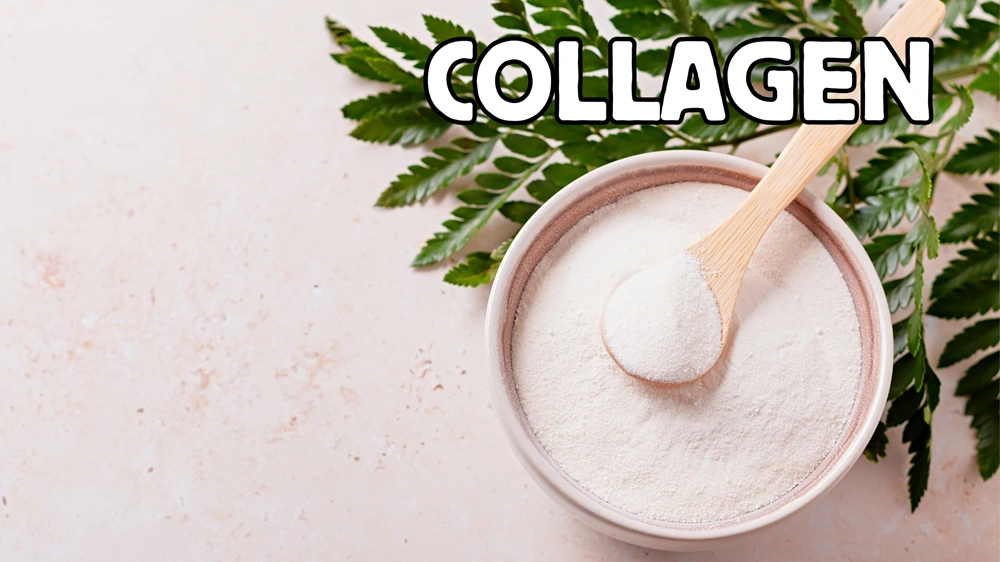
So, why bother with either? Both marine collagen and bovine collagen peptides can help counteract the natural decline in collagen as you age, supporting your body in ways that diet alone might not. They’re popular in custom formulas for everything from glowing skin to stronger joints, but their benefits shine brightest when paired with a healthy lifestyle—think balanced meals, regular exercise, and sun protection.
- Skin Goals: If you’re chasing that dewy, youthful look, marine collagen’s Type I focus and potential for better absorption might give it a slight edge. Bovine collagen also helps, especially with its Type III boost for skin structure.
- Joint Support: Bovine collagen’s mix of Types I and III (and sometimes Type II in specific formulations) makes it a go-to for joint health supplements, especially for active folks or those with arthritis.
- Gut Health: Bovine collagen’s Type III collagen may support the gut lining, potentially helping with digestive issues, though research here is still emerging.
- Lifestyle Fit: Marine collagen suits those avoiding beef, while bovine collagen is ideal for those steering clear of fish. Both are versatile, available in powders, capsules, or liquids, often crafted through OEM solutions for easy integration into your routine.
The real question is: What’s your priority? If you’re all about sustainability and skin health, marine collagen might call your name. If you want a budget-friendly option with broader tissue support, bovine collagen peptides could be the way to go.
Marine Collagen vs Collagen Peptides: How to Choose
Choosing between marine collagen and collagen peptides can feel like picking your favorite song—both are great, but it depends on your vibe. Here’s how to decide:
- Health Goals: For skin, marine collagen’s Type I focus is a strong contender. For joints or gut health, bovine collagen’s Type III (and sometimes Type II) might be better. If you’re an athlete, bovine collagen’s muscle-building potential could tip the scales.
- Allergies and Diet: Fish allergies? Stick with bovine. Beef allergies or dietary restrictions? Marine collagen’s your friend. Always check labels for allergen info.
- Budget: Bovine collagen is typically cheaper, making it easier to stick with long-term. Marine collagen’s premium price often reflects its sourcing and processing.
- Sustainability: If eco-friendliness matters to you, marine collagen’s use of fish byproducts might align with your values.
- Quality Matters: Look for supplements from trusted manufacturers with third-party testing. High-quality packaging services ensure the product stays potent. Powders are versatile for smoothies or coffee, while capsules are great for on-the-go.
Here’s a handy comparison table to visualize the differences:
| Feature | Marine Collagen | Bovine Collagen Peptides |
|---|---|---|
| Source | Fish skin and scales | Cow hides |
| Collagen Types | Primarily Type I | Types I and III |
| Bioavailability | Potentially higher | Good |
| Sustainability | Often from by-products | Varies by sourcing |
| Allergy Considerations | Avoid if allergic to fish | Avoid if allergic to beef |
| Cost | Often more expensive | Generally more affordable |
FAQs
What is the best form of collagen to take?
Collagen peptides (hydrolyzed collagen) are the most effective due to their high bioavailability, easy absorption, and versatility in mixing with food or drinks. Marine and bovine sources are both effective, depending on dietary preferences.
Who should not take marine collagen peptides?
People with fish allergies should avoid marine collagen. Those with kidney issues or on restricted diets should consult a doctor due to potential protein overload.
Is it better to take collagen or collagen peptides?
Collagen peptides are better than whole collagen because they’re broken down into smaller, more bioavailable fragments, making them easier for the body to absorb and use.
Is marine collagen better than collagen peptides?
Marine collagen is a type of collagen peptide, typically sourced from fish, and is more bioavailable (up to 1.5x) than bovine collagen peptides. It’s better for skin and hair due to its high type I collagen content, but the choice depends on dietary needs.
What to avoid when taking collagen?
Avoid overconsumption (stick to recommended doses), low-quality supplements with additives, and taking without consulting a doctor if you have allergies, kidney issues, or are pregnant. Ensure no interactions with medications.
Is marine collagen hard on the kidneys?
Marine collagen is generally safe, but excessive protein intake may strain kidneys in those with pre-existing kidney conditions. Consult a doctor if at risk.
Why should you take collagen at night?
Taking collagen at night may enhance skin repair and recovery during sleep, as the body regenerates tissues. However, timing is less critical than consistency.
Conclusion
In the showdown of marine collagen vs collagen peptides, there’s no clear winner—it’s all about what fits your life. Marine collagen, with its fishy roots and Type I focus, might be your pick for radiant skin and eco-conscious choices. Bovine collagen peptides, with their Types I and III blend, offer versatility for joints, muscles, and even gut health, often at a lower cost. Both are powerhouse dietary supplement ingredients, crafted through advanced sports nutrition manufacturing and available in custom formulas to suit your needs. The key? Choose a high-quality product, consult your doctor if you’re unsure, and pair it with a healthy lifestyle. After all, supplements are like the cherry on top of a well-balanced sundae—they enhance, but they don’t make the whole dessert.
References
- Geahchan, S., Baharlouei, P., & Rahman, A. (2022). Marine Collagen: A Promising Biomaterial for Wound Healing, Skin Anti-Aging, and Bone Regeneration. Marine Drugs, 20(1), 61. https://www.mdpi.com/1660-3397/20/1/61
- Asserin, J., Lati, E., Shioya, T., & Prawitt, J. (2015). The effect of oral collagen peptide supplementation on skin moisture and the dermal collagen network: evidence from an ex vivo model and randomized, placebo-controlled clinical trials. Journal of Cosmetic Dermatology, 14(4), 291-301. https://doi.org/10.1111/jocd.12174
- Wang, H. (2024). Unlocking the Therapeutic Potential of Marine Collagen: A Scientific Exploration for Delaying Skin Aging. Marine Drugs, 22(4), 159. https://www.mdpi.com/1660-3397/22/4/159
- Geahchan, S., Baharlouei, P., & Rahman, A. (2022). Marine Collagen: A Promising Biomaterial for Wound Healing, Skin Anti-Aging, and Bone Regeneration. Marine Drugs, 20(1), 61. https://www.mdpi.com/1660-3397/20/1/61
- Moskowitz, R. W. (2000). Role of collagen hydrolysate in bone and joint disease. Seminars in Arthritis and Rheumatism, 30(2), 87-99. https://doi.org/10.1053/sarh.2000.01720
- Zdzieblik, D., Oesser, S., Baumstark, M. W., Gollhofer, A., & König, D. (2015). Collagen peptide supplementation in combination with resistance training improves body composition and increases muscle strength in elderly sarcopenic men: a randomised controlled trial. British Journal of Nutrition, 114(8), 1237-1245. https://doi.org/10.1017/S0007114515002810

